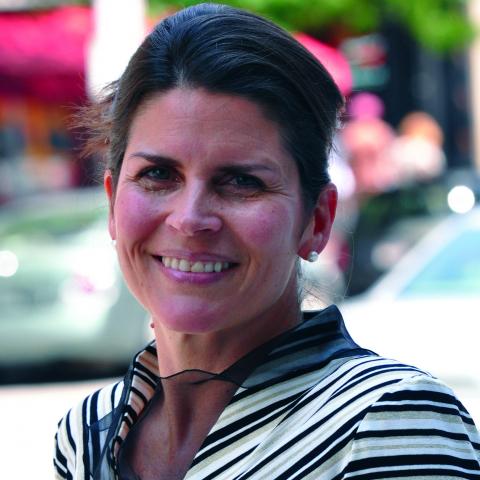A Gift to Women Instrumentalists

Kristine Moyer-Higgins
Phil Farnsworth
Working first in a jazz band and then in the business world taught Kristine Moyer-Higgins the power of partnership. Now she’s helping Berklee student musicians to succeed by founding a scholarship for talented women instrumentalists.
After a four-year stint in Atlantic City playing saxophone in pit orchestras and casinos, Moyer-Higgins attended business school at Wharton for her MBA and moved into the health-care and technology sectors. When she changed direction again to focus on her family, she took the opportunity to get involved at Berklee. “It seems to be the confluence of several parts of my life,” Moyer-Higgins said, adding that she still performs several times a year with her jazz combo.
Moyer-Higgins joined Berklee’s presidential advisory council in 2008 and soon began taking part in the college’s fledgling mentorship program. Each year, 35 to 40 students are matched up with members of the council and the college’s board of trustees. “The mentorship program is a really unique way for students and community members to connect,” she says.
In fact, Moyer-Higgins and one mentee, Ann Pedersen ’08, connected so strongly that she invited Pedersen to sing the jazz standard “Time after Time” at her wedding. The student she mentored the following year cooked an authentic Japanese dinner for Moyer-Higgins and her husband and, on another visit, joined the family for Thanksgiving. In both cases, Moyer-Higgins attended the students’ recitals.
“This is a terrific program for both sides,” says Moyer-Higgins. She has enjoyed making an impact at a critical point in a young student’s life.
Pedersen, now completing a master’s degree in jazz studies in California, says that the pairing gave her an unexpected friendship. Music was certainly a part of their connection. Pedersen appreciated having an adult confidante who wasn’t her parent, teacher, or colleague. “I have a very great respect for her,” Pedersen said. As a mentor, “she’s really gone above and beyond. . . . She really wants to get to know you and make you a part of her life.”
The close interaction with students impressed Moyer-Higgins with how effectively Berklee prepares them for a music career—even careers that don’t involve performing. Her own undergraduate degree from West Chester University in Pennsylvania is in music education. At the school at that time, “you were either going to be a teacher or you were going to be a professional [performer],” says Moyer-Higgins. “At Berklee [students] really have an opportunity to participate in music for the rest of their lives.”
And she wanted to help make that happen for others. In talking with Berklee President Roger H. Brown, Moyer-Higgins learned that the college has greatly improved the student body’s gender balance and has doubled the percentage of women attending. While Berklee has incubated talented female instrumentalists such as trombonist Aubrey Logan and woodwind player Anat Cohen, more than half the women currently attending Berklee study voice.
Though Moyer-Higgins loved studying the sax in college—the practicing, the striving for quality—she remembered a subtle sense of discouragement that came from being outnumbered. As the only woman in a 17-piece college jazz band, she didn’t feel comfortable going to student jam sessions. “Not that I wasn’t invited, but I didn’t really feel invited to do the things that actually help you get better: the informal parts of music,” she says. “It was just a vibe you would get that this was a guys’ thing.”
Trumpeter Christine Fawson, a member of the Brass Department faculty who has performed at festivals around the world, says that this scholarship would be welcome at Berklee. The broader jazz world is “still a boys’ club,” Fawson observes. “Having a scholarship would give instrumentalists more confidence,” Fawson says, letting them know they belong in the field. In addition, Christine Connors, Berklee’s vice president for human resources, diversity, and inclusion, said that the college has made the recruitment of women instrumentalists a major priority in the next three years.
Moyer-Higgins hopes that the Berklee scholarship will help women instrumentalists become a “critical mass to bond with” and to play with. She adds, “When you’re the only one, it’s easy to get overlooked.” But at Berklee, getting overlooked is a lot less likely when you find a mentor like Moyer-Higgins to help power your performance.
Danielle Dreilinger is a writer and editor in Berklee’s Communications Department




